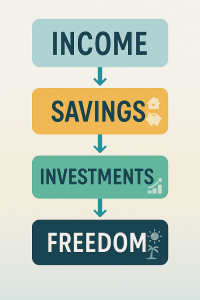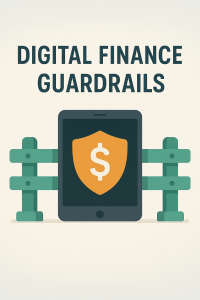
Personal Finance: A Lifelong Journey to Gain Freedom
Introduction
Money is a word that rings different bells for different people — some get excited, some get scared, and others are indifferent. From bartering to gold to today’s paper and digital currencies, money remains the universal medium of exchange. It fuels everything from our basic needs to our highest desires. Yet, in many households, money is still considered a taboo topic — something “dirty” or “materialistic.” As the saying goes:
“Too many people spend money they haven’t earned, to buy things they don’t want, to impress people they don’t like.” — Will Rogers
Ignoring money, however, doesn’t protect us — it often harms us. Instead, teaching its virtues to the young generation is essential for prosperity and well-being.
Why Money is Neglected… Though It’s Fundamental?
Money is often linked to greed, corruption, or materialism. Talking about it can be seen as shameful. Yet this perception ignores the positive power of money: it saves lives, funds vacations, supports charities, stimulates economies, creates jobs, pays taxes, and strengthens nations.
The Basics: Earn, Spend, Save, Invest
At its core, personal finance revolves around two flows: earning and spending. Three scenarios follow:
- If you earn more than you spend → you save.
- If you spend equal to what you earn → you break even.
- If you spend more than you earn → you fall into debt.
Only the first scenario allows financial growth. But saving isn’t enough: inflation erodes money’s value over time. That’s why investing — putting money where it grows faster than inflation — is vital.

The Magic of Compounding
Finance has its own “superpower” — compound interest. The formula is:
FV = P × (1 + r)^n
Where FV = Future Value, P = Principal, r = rate of return, and n = number of years. The longer you let your money grow, the more exponential the returns.
Digitalization: Friend and Foe
Today’s financial world is more accessible than ever thanks to digital platforms. But convenience also brings risks — scams, hidden fees, and poor advice. Always diversify, do your homework, and invest according to your risk appetite.

A Lifelong Journey
Personal finance is not a one-time project; it’s a lifelong journey that demands patience, discipline, and constant learning. Automating savings, rewarding yourself at milestones, and keeping a long-term vision make the journey enjoyable.
In the end, personal finance is less about money itself and more about what it enables: freedom, choices, and peace of mind.